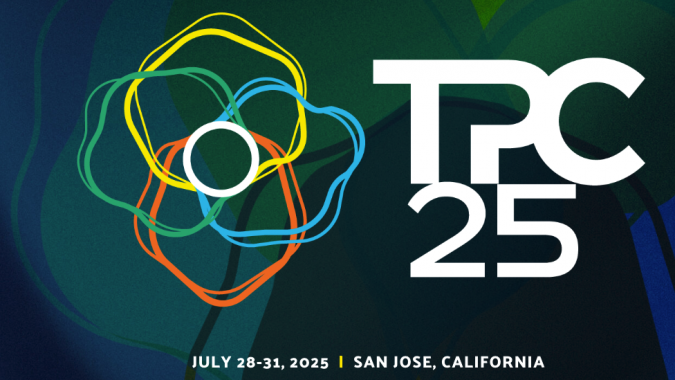
Since its inception, many questions about the Trillion Parameter Consortium (TPC) have been asked. Rapid changes in AI technology and the emergence of large language models (LLM) have created many opportunities for intelligent processes to aid all sectors of the economy, including Science and Engineering. While progress with LLMs has been startling, using this technology in the Sciences requires focusing on the needs unique to the scientific process. The TPC was started to address these needs and provide a community that supports AI for Science.
Some of the most asked questions about the TPC and the TPC25 event are answered below.
1. What is the goal of the Trillion Parameter Consortium (TPC)?
The TPC aims to advance and accelerate the responsible, open, and safe development of large-scale AI capabilities for scientific and engineering applications. Its growing community represents the intersection of AI and HPC, encompassing not only the Science of AI and the use of AI for scientific discovery but also the challenges of harnessing the necessary extreme-scale systems spanning data and computation.
2. Why do we need AI for Science? Can’t we just use or fine-tune enterprise models?
The short answer is “Not Really.” There are several reasons. First, using AI spans more than generative AI and language models. While the methodology is powerful, there are many differences in how Science acquires and uses data (we can create and tailor our training data) and an interest in quantitative methods. Second, combining AI, HPC, and Big data leads to a new method of accelerating scientific discovery. Read the HPCwire article, Feeding the Virtuous Cycle of Discovery: HPC, Big Data, and AI Acceleration, for a more detailed explanation.

(Source: Inkoly/Shutterstock)
3. Who Started the TPC, and who is involved?
Established in 2023, the TPC community has grown to more than 1,400 participants from over 100 organizations around the globe. Participants include computer scientists, mathematicians, and computational scientists; domain experts from astronomy, physics, chemistry, biology, environment, materials, and climate science; and experts in large-scale computing systems, computational frameworks, data management, ethical considerations, and responsible AI practices.
A more detailed background white paper is available. The TPC is free to join and open to all interested parties (novice to expert).
4. Do you have meetings or events, can anyone attend?
Yes, we meet several times yearly, often as part of other conferences (We just had a workshop at ISC 2025). Our first “all hands meeting” is July 28-31, 2025, in San Jose, California. This worldwide gathering and exhibition will include AI leaders from industry, academia, national laboratories, the vendor community, funding agencies, and VCs to develop best practices for utilizing AI for scientific discovery and engineering at scale.
5. Why should I be interested in the TPC?
AI is accelerating scientific discovery. Beginning with traditional HPC data, AI-based systems can be trained to recognize and produce similar results faster and with less computing overhead than traditional number-crunching methods (the models take considerable resources to train and require traditional HPC-generated data). The TPC is focused on building an open community that wants to take advantage of this capability and support AI for scientific discovery. Specifically, the TPC addresses many topics of particular importance to Science. These include:
Transparency
Fairness
Ethical AI practices
Mitigating bias
Ensuring trustworthiness
Protecting privacy
Ensuring safety
6. I don’t know anything about AI. Is the TPC for beginners?
 Absolutely. If you are a scientist and know nothing about AI, TPC25 is designed for you. There are tutorials, hackathons, presentations, and working groups. Plus lots of discussions with fellow community members.
Absolutely. If you are a scientist and know nothing about AI, TPC25 is designed for you. There are tutorials, hackathons, presentations, and working groups. Plus lots of discussions with fellow community members.
7. I’m an experienced physicist, chemist, or engineer, and quite frankly, I don’t trust any of this AI stuff. How does it help HPC? Do you have examples?
Your skepticism is welcome. It is not immediately obvious that AI should work in many of these cases, yet it does. There are many examples of how AI is accelerating HPC. Here are two examples:
8. How open is the TPC? From what I understand many of the AI models are pretty much a black box. Where does the TPC data come from?
The TPC is built on openness. Science cannot function in a closed “black box” environment that cannot be replicated elsewhere. Building scientific models requires starting with open data, continuing with an open model-building process, and using freely available scientific models. The TPC’s mission will help support a community with these goals in mind.
If you have further questions, join the TPC and ask them. In addition, attend TPC25 to get in on a ground-floor moment and become a part of the worldwide community accelerating scientific discovery.

